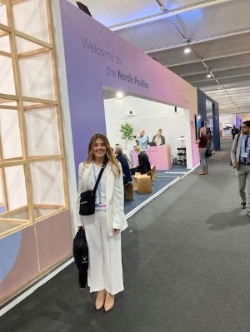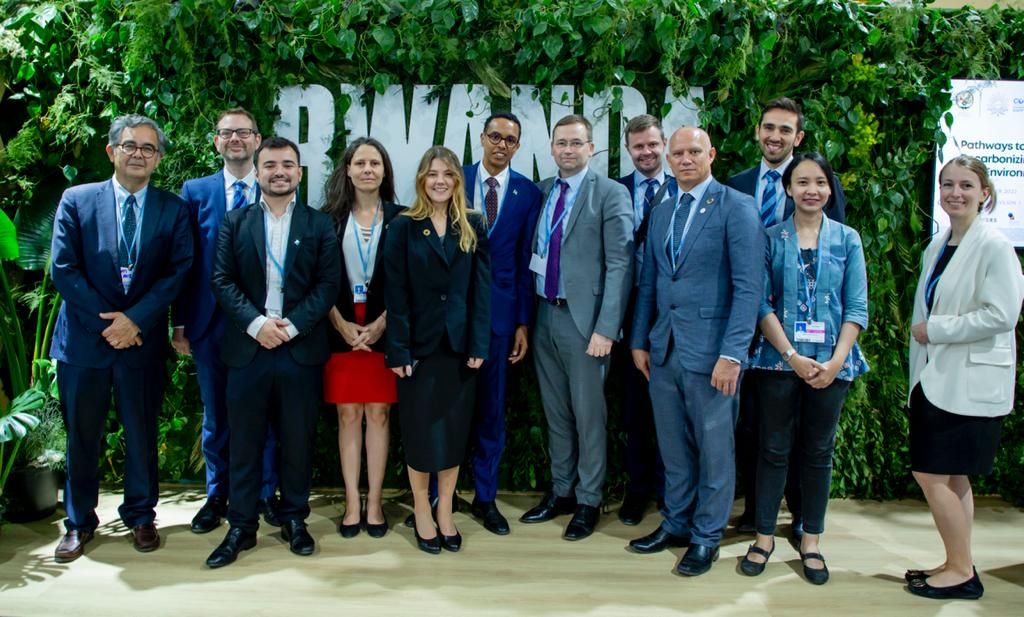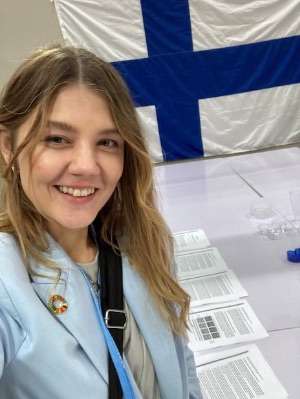From Belval to Sharm El-Sheikh-Sara Tolonen and COP27
Publication Date: March 8, 2023
In 2020, Sara Tolonen was finishing her Master in European Governance just when the COVID pandemic began. A little over 2 years later, she was representing her native country Finland at the COP27 conference in Sharm El-Sheikh. On International Women's Day, read on to find out more about Sara's journey from Belval back to Finland and then to Egypt.
1. You did your Master degree at the University of Luxembourg and also did your Bachelor degree outside your home country. How did you find out about Uni.lu and what path brought you here?
My history with Luxembourg goes back a long time. After graduating from high school in 2011, I wanted to do a gap year to explore the world and improve my language skills.
I wanted to become fluent in English and enhance my French skills. This is why I was happy when I was offered an opportunity to move to Luxembourg and work as an au pair. During my gap year, I developed an interest in EU affairs. After this, I ended up doing my bachelor's degree in Stirling, Scotland. I chose Scotland because it is highly valued for its education and at the time, my French skills were not sufficient to study in French in Luxembourg. I chose to do a double honors degree with a combination of law and business studies. I wanted to do a useful general degree that would guarantee employment after graduation.
I enjoyed my time in the United Kingdom and learned a great deal during my bachelor studies. Nevertheless, I still had the dream of studying EU affairs in the back of my mind and frankly, I missed the international vibe of the heart of Europe that Luxembourg has.
I also found that while I enjoyed approaching the EU from a legislative angle through my studies, I was much more into the policy side. This is why I decided upon my graduation to move back to Luxembourg to pursue a Master in European Governance. This programme was in fact a bilingual degree in English and French so I had an opportunity to improve my French again while studying what I am passionate about.
2. Tell us what you are doing professionally today and how your studies led you there (or not!)
Today I live and work in Helsinki back in my home country Finland. I work in the Ministry of Finance in the Co-Chair team of the Coalition of Finance Ministers for Climate Action (CFMCA). Finland has been co-chairing this intergovernmental group since its establishment in 2019. The Coalition has currently 83 countries and it has been steadily growing. I have always been a climate activist at heart. During my studies, I was very interested in environmental policy issues. My Master’s thesis was entitled ‘Confronting Climate Emergency - To what extent Deliberative Democracy can provide an alternative to the current Climate Governance?' A Study of La Convention Citoyenne pour le Climat (France)’ where I critically assessed climate governance through a democratic lens. While writing my Master’s thesis, I worked in an investment bank in Luxembourg. This position gave me valuable experience and great insights into the world of finance but I was again craving to dive deep in the policy context.
Upon moving back to Finland in 2021 and starting my new role in the Ministry of Finance, I jumped straight into the heart of international climate action. Our focus is to mainstream climate action in economic, financial, and fiscal policies. In the Coalition, the value-added comes from sharing experiences and mutual learning. It is somewhat relieving to know that all countries in the world are confronted with similar challenges but try to find solutions together. I am still very much an EU enthusiast. It is great to see how much the EU is currently doing for climate action. The fit-for-55 package for instance has been a historical development and it makes me feel hopeful about the future. Someday I wish to combine both my passions: climate action in the European policy context.
I’m grateful to the University of Luxembourg for everything it has given me. I’m still using the ideas and concepts learned in my classes. I have been lucky to stay in contact with professors and alumni and it has been amazing to follow the career paths of my fellow students. Today my role with Uni.lu has switched from being a student to sharing my knowledge and experience as an alumna and practitioner with the current students. I have participated in sustainable development classes (in the very same rooms I have sat in!) and held presentations about global climate governance, climate finance, and the United Nations COP processes. I’m very thankful for my professors who have been supportive throughout my studies and career and continue our dialogue.

Sara at the Nordic Pavillon in Sharm El-Sheikh
3. How did you decide to attend the recent COP27 conference in Sharm El-Sheikh?
I have been so honoured to have been a member of the Finnish delegation in COPs twice now; first in Glasgow and now in Sharm El-Sheikh. Both times, the highlight for my team has been the Finance Day, which now seems to be part of the COPs on a permanent basis.
For a long time now there has been a strong demand for Ministers (and Ministries) of Finance to be in the climate scene. It is true that we can overcome many of the climate challenges we are facing with effective economic and financial policies. The ministries of finance hold the keys for this kind of action through various tools such as budgeting, carbon pricing and taxation, and mobilizing finance. During the Finance Day, the CFMCA has its own ministerial-level meeting and the ministers have an opportunity to participate in several other events, such as panel discussions and bilaterals. Finance ministers do not negotiate in the climate negotiations themselves – I see their role as supportive and enabling.
Overall, participating in COPs has been an amazing opportunity for learning and understanding the big picture. There are so many actors and initiatives in the climate community. I hope to remain a part of it as long as I can.
4. Tell us about your experience at the conference and whether you are more or less hopeful about humanity’s ability to address climate change after the conference?
If I am honest, this year I experienced a bit of what I term as post-COP blues. There are always some never-ending debates and tough challenges and the ship is moving very slowly. After my initial despair, I started to re-evaluate the progress made this year. My main disappointments were concerning the nationally determined contributions (NDCs). The current NDCs are simply not ambitious enough. Another disappointment was the lack of focus on phasing out ALL fossil fuels and emissions, e.g. natural gas. From the financial point of view, overlooking the importance of Art 2.1 C of making finance flows consistent with the Paris Agreement was another setback. I hope to see much more discussion in this area in the near future. Lastly, the famous 100 billion goal of climate finance to developing countries was again not achieved.
Some positive developments included:
1) the recognition of finance ministers' and financial sectors’ roles in addressing climate change.
2) Loss and Damage dimension progress, both funding proposal and Santiago Network
3) Adaptation issues received much attention and new funding pledges were announced
4) Keeping 1,5 C alive (!)
5) Global stock take progress, which remains to be seen in COP28
6) The issue of nature loss and biodiversity were salient
7) New just transition partnerships being formed (Vietnam, Senegal and India)
8) Art 6 market mechanism technical level progress
Although some issues remain, progress was made again despite negatively painted coverage in the media. I have so much respect for the negotiators who manage to get through long days and deal with difficult issues. They truly put their heart and soul into their work, which I find truly inspiring. On another note, humanity received good news in December. The biodiversity conference COP15 in Montréal, which I also participated in, reached a landmark agreement ’30 by 30’ for biodiversity, which might give a little push to the climate action forum as well.
5. If you could get everyone reading this to do a single thing to contribute at a micro level to addressing climate change, what would it be and why?
I cannot advise just one thing for climate action. Mainstreaming climate action and a more sustainable way of thinking in everyday life needs to be holistic. A great start is to start by counting your carbon footprint. Many trustworthy websites offer this for free. Challenging everyday habits makes a difference. A simple question ‘is this sustainable?’ and if not, ‘are there better alternatives for this choice?’ are good starting points. It is relatively easy to evaluate sectors such as food, transportation, and consumption habits. Simple things such as favoring local and plant-based food, using public transportation, and buying second-hand goods can accumulate quickly and create a positive impact.
Of course, there are things that are more difficult, such as energy choices, which are harder to control as an individual. For example in Finland, heating buildings is costly and not entirely sustainable. I would recommend having an economical mindset and applying an energy-saving mode, especially during times of crisis. Aim for greener options, when possible. I have much trust that the green transition will not only create better choices for the planet but also for its people.
Finally, as a firm believer in political decision-making, I encourage everyone to actively participate in the climate discourse and use their right to vote and protest.

Sara with other delegates at COP27





